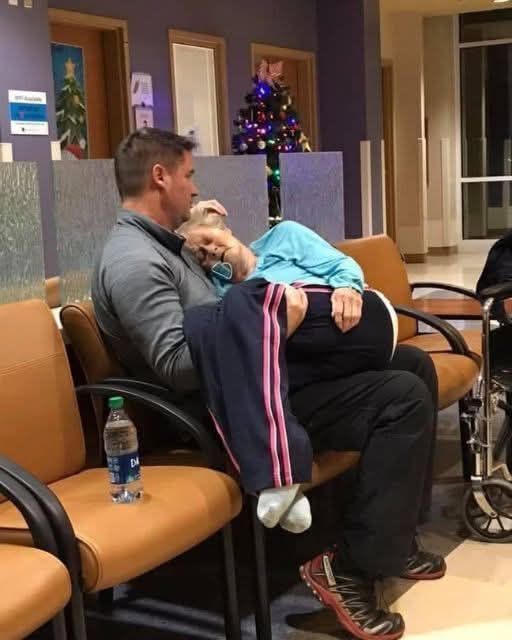I never intended to stay as long as I did. I had only brought my grandmother in for some routine tests, and we expected to be in and out by noon. But delays at the lab, a slight dip in her blood pressure, and unexpected complications stretched our visit to five hours in the waiting room.
She shivered despite the warmth of the room. I draped my jacket over her legs and offered to get her some water, but she didn’t respond. Instead, she leaned into me, curling up the way she used to when I was a child afraid of thunderstorms.
One of the passing nurses smiled sympathetically. “She’s lucky to have you.”
I nodded but said nothing. Because what I hadn’t told anyone—not even my sister—was that lately, she didn’t always remember who I was.
That morning, she had called me “Teddy.” Teddy was my grandfather, gone for nearly fifteen years. Later, as we pulled up to the clinic, she referred to me as “Coach.” I had never played a sport in my life.
Then, in the dim light of the waiting room, with Christmas lights blinking faintly in the corner, she wrapped her frail arms around me and whispered, “Don’t leave me again.”
I held her closer and didn’t correct her. Because, for the first time in days, she looked peaceful—like she felt safe.
I didn’t have the heart to ask what she meant by “again.”
The test results were inconclusive, and the doctors decided to keep her overnight for observation. The moment they said so, she grew restless, tugging at her blanket and insisting she needed to go home to water her plants. I stayed, of course. I spent the night in the uncomfortable chair beside her bed, waking every few hours to make sure she hadn’t tried to get up on her own.
By morning, she was more herself. Her eyes met mine with clarity, and she said, “Thank you, Liam. You’re a good grandson.”
Relief washed over me. “You remember me, Grandma?”
She smiled, faint but familiar. “Of course, I do. You’re my Liam.” But then, her gaze drifted past me, and the recognition in her eyes faded. “Teddy, did you remember to bring the newspaper?”
It felt like an emotional whiplash—one moment, she knew me; the next, she was lost in a past I couldn’t follow. When my sister Sarah arrived later that day, I told her about Grandma calling me by different names, about the way she clung to me as if I were someone else.
Sarah squeezed my hand. “The doctor warned us this might happen. It’s the dementia, Liam.”
I knew she was right, but that didn’t make it hurt any less. This woman who had been my rock—who had taught me how to bake cookies and read me bedtime stories—was slipping away, piece by piece.
Over the following weeks, the confusion worsened. Some days, she thought I was her brother, Thomas. Other times, she would look right through me as if I were a stranger. But then there were the moments that kept me going—a familiar squeeze of my hand, a whispered “Liam,” a fleeting spark of recognition that reminded me she was still in there somewhere.
One afternoon, I read to her from her favorite book, Little Women. As I reached the part where Jo March leaves home for New York, Grandma reached out and clutched my hand.
“Don’t go, Teddy,” she murmured, her voice frail but insistent.
I swallowed hard. “I’m not going anywhere, Grandma. I’m right here.”
She looked at me, her eyes glistening with an old sorrow. “You always leave. You left me all alone.”
I didn’t understand. Grandpa had been gone for years. I had never left her. But in that moment, it didn’t matter what was real and what wasn’t. What mattered was the fear in her eyes, the grief in her voice.
“I promise,” I whispered. “I’m not leaving.”
She gripped my hand tightly. “Promise?”
“I promise.”
A few days later, during a rare moment of clarity, she looked out the window at the falling autumn leaves and asked, “Liam, do you remember Danny?”
Danny—her son. My uncle. He had died in a car accident when I was a baby. I barely remembered him, only the stories my mother had told.
“Yes, Grandma,” I said softly. “I remember.”
A tear slipped down her cheek. “He left me too soon. Just like your grandfather.”
And suddenly, everything made sense. The names she called me, the way she clung to me. The “again.” She wasn’t just confusing me with my grandfather. She was mistaking me for her son—the child she had lost too soon.
That realization changed everything. From that day forward, I stopped correcting her. When she called me Teddy, I answered. When she talked to me as Danny, I listened. If I could bring her comfort, if I could make her feel less alone, then it didn’t matter who she thought I was. I would be whoever she needed me to be.
Grandma never had a miraculous recovery. She never regained all her memories. But there was one moment that stood out—a moment I would carry with me forever.
One evening, she looked at me, really looked at me, and said, “You remind me so much of Danny. He had your kind eyes.”
It wasn’t perfect clarity, but it was something more profound—a bridge between the past and the present. A connection that transcended memory. I realized then that even as the mind fades, love remains. The heart remembers.
She passed away peacefully not long after, surrounded by those who loved her. In the weeks that followed, I found comfort in the time we had shared, in the quiet lessons of love and patience she had left behind.
The greatest gift we can offer those we love is our presence. To meet them where they are, to love them as they are, even when it’s hard. Because sometimes, in the midst of loss and confusion, we find the deepest connections—the ones that never truly fade.
If this story touched your heart, share it with someone who needs to hear it. And if you’ve ever experienced something similar, I’d love to hear your story. Let’s keep the memory of love alive, together.

